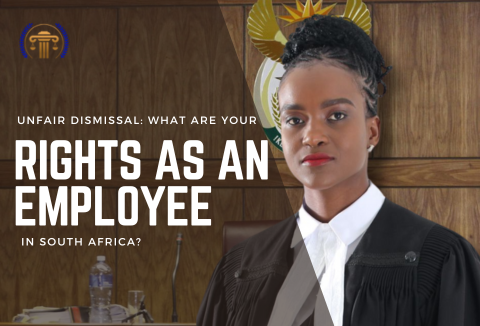As an employee in South Africa, understanding your rights regarding dismissal is crucial. Let’s explore the legal aspects of unfair dismissal and how you can safeguard your position:
1. What Constitutes a Dismissal?
An employer can dismiss a worker through various options:
- Notice: The employer provides notice, asking the worker to leave work after a specified period (e.g., a week or more). The worker receives wages for the time worked and any outstanding leave pay.
- Payment in Lieu of Notice: The worker leaves immediately and is paid instead of receiving notice. The payment should cover the notice period (e.g., one week’s pay).
- Retrenchment: If the employer terminates employment due to operational reasons, the worker is entitled to severance pay (at least one week’s remuneration for each full year worked).
2. Fair Dismissal Reasons
Workers have the right to fair dismissal procedures and reasons under the Labour Relations Act (LRA). Unfair dismissal claims can be made through the CCMA (Commission for Conciliation, Mediation, and Arbitration) in the following circumstances:
- Fixed-Term Contract: If a contract worker’s fixed-term contract is suddenly ended or renewed on less favorable terms.
- Constructive Dismissal: When a worker is forced to resign due to an intolerable working environment created by the employer.
- Maternity Leave: A woman not taken back into her job after maternity leave.
- Transfer of Contract: If a worker’s contract is transferred to another employer under substantially less favorable conditions.
3. Automatically Unfair Dismissals
Certain reasons for dismissal are automatically invalid:
- Exercising Rights: Dismissing a worker for exercising rights granted by the LRA or participating in proceedings under the Act.
- Union Activities: Taking part in lawful union activities.
- Legal Strikes or Protests: Participating in a legal strike, industrial action, or protest.
- Pregnancy: Dismissing a pregnant worker or any reason related to pregnancy.
- Refusing Unfair Work: Refusing to do the work of someone who was on strike.
- Arbitrary Discrimination: Except for specific cases (e.g., retirement age or inherent job requirements), arbitrary discrimination is not a valid reason for dismissal.
4. Compensation for Unfair Dismissal
- If dismissal is found to be procedurally or substantively unfair, compensation can range from 12 to 24 months1.
- In cases of pregnancy, racism, or sexism, the employee may be entitled to up to 24 months’ wages as compensation2.
Remember, the Labour Relations Act aims to protect employees from suffering caused by unfair dismissal. Seek legal advice if you believe your dismissal was unjust.










